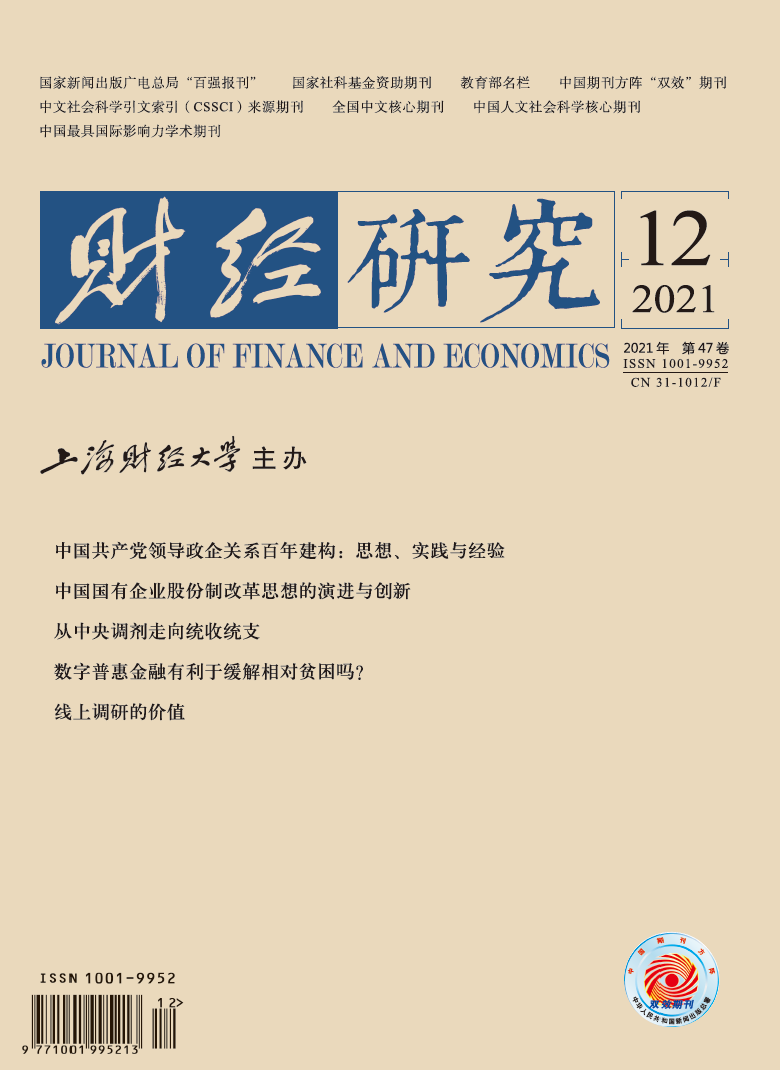长期以来,中小股东参与公司治理的实际效果饱受质疑,而社交媒体为中小股东提供的“在线发声”平台极大地扭转了中小股东边缘化的弱势局面。文章基于2013—2017年雪球股票论坛的讨论帖数据,分析了中小股东在雪球股票论坛的讨论对企业会计稳健性的影响及其机制。研究发现,中小股东在社交媒体上的在线讨论显著提高了被讨论公司下一年的会计稳健性,这一作用主要通过增加监管介入、抑制大股东掏空和降低企业盈余管理水平实现。此外,社交媒体讨论提高会计稳健性降低了债务融资成本,增加了股东权益保护,提高了公司业绩。因此,社交媒体已成为影响会计稳健性的重要因素,是中小股东参与公司治理的新“通道”。文章的研究有助于揭示社交媒体的公司治理价值,丰富和更新中小股东在公司治理中的作用和功能,为会计稳健性的影响因素研究提供新的视角与证据。
中小股东“在线发声”与企业会计稳健性——来自雪球论坛的证据
摘要
参考文献
3 李晓溪,饶品贵,岳衡. 年报问询函与管理层业绩预告[J]. 管理世界,2019,(8):173−188. DOI:10.3969/j.issn.1002-5502.2019.08.013
7 田高良,封华,于忠泊. 资本市场中媒体的公司治理角色研究[J]. 会计研究,2016,(6):21−29. DOI:10.3969/j.issn.1003-2886.2016.06.004
11 杨凡,张玉明. 互联网沟通能降低股价同步性吗?−来自“上证e互动”的证据[J]. 中南财经政法大学学报,2020,(6):108−119. DOI:10.3969/j.issn.1003-5230.2020.06.011
14 张俊生,汤晓建,李广众. 预防性监管能够抑制股价崩盘风险吗?−基于交易所年报问询函的研究[J]. 管理科学学报,2018,(10):112−126. DOI:10.3969/j.issn.1007-9807.2018.10.009
17 Ahmed A S, Duellman S. Accounting conservatism and board of director characteristics: An empirical analysis[J]. Journal of Accounting and Economics,2007,43(2−3): 411−437. DOI:10.1016/j.jacceco.2007.01.005
18 Ang J S, Hsu C, Tang D, et al. The role of social media in corporate governance[J]. The Accounting Review,2021,96(2): 1−32. DOI:10.2308/TAR-2018-0144
19 Antweiler W, Frank M Z. Is all that talk just noise? The information content of internet stock message boards[J]. The Journal of Finance,2004,59(3): 1259−1294. DOI:10.1111/j.1540-6261.2004.00662.x
20 Bartov E, Faurel L, Mohanram P S. Can Twitter help predict firm-level earnings and stock returns?[J]. The Accounting Review,2018,93(3): 25−57. DOI:10.2308/accr-51865
21 Basu S. The conservatism principle and the asymmetric timeliness of earnings[J]. Journal of Accounting and Econo- mics,1997,24(1): 3−37. DOI:10.1016/S0165-4101(97)00014-1
22 Bushman R M, Piotroski J D. Financial reporting incentives for conservative accounting: The influence of legal and political institutions[J]. Journal of Accounting and Economics,2006,42(1−2): 107−148. DOI:10.1016/j.jacceco.2005.10.005
23 Chen H L, De P, Hu Y, et al. Wisdom of crowds: The value of stock opinions transmitted through social media[J]. The Review of Financial Studies,2014,27(5): 1367−1403. DOI:10.1093/rfs/hhu001
24 Duro M, Heese J, Ormazabal G. The effect of enforcement transparency: Evidence from SEC comment-letter reviews[J]. Review of Accounting Studies,2019,24(3): 780−823. DOI:10.1007/s11142-019-09503-1
25 García Lara J M, García Osma B, Penalva F. Accounting conservatism and corporate governance[J]. Review of Accounting Studies,2009,14(1): 161−201. DOI:10.1007/s11142-007-9060-1
26 Hirshleifer D. Presidential address: Social transmission bias in economics and finance[J]. The Journal of Finance,2020,75(4): 1779−1831. DOI:10.1111/jofi.12906
27 Hong H, Jiang W X, Wang N, et al. Trading for status[J]. The Review of Financial Studies,2014,27(11): 3171−3212. DOI:10.1093/rfs/hhu048
28 Hutton A P, Marcus A J, Tehranian H. Opaque financial reports, R2, and crash risk[J]. Journal of Financial Economics,2009,94(1): 67−86. DOI:10.1016/j.jfineco.2008.10.003
29 Jensen M C, Meckling W H. Theory of the firm: Managerial behavior, agency costs and ownership structure[J]. Journal of Financial Economics,1976,3(4): 305−360. DOI:10.1016/0304-405X(76)90026-X
30 Jiang G H, Lee C M C, Yue H. Tunneling through intercorporate loans: The China experience[J]. Journal of Financial Economics,2010,98(1): 1−20. DOI:10.1016/j.jfineco.2010.05.002
31 Khan M, Watts R L. Estimation and empirical properties of a firm-year measure of accounting conservatism[J]. Journal of Accounting and Economics,2009,48(2−3): 132−150. DOI:10.1016/j.jacceco.2009.08.002
32 Kim J B, Zhang L D. Financial reporting opacity and expected crash risk: Evidence from implied volatility smirks[J]. Contemporary Accounting Research,2014,31(3): 851−875. DOI:10.1111/1911-3846.12048
33 Lafond R, Roychowdhury S. Managerial ownership and accounting conservatism[J]. Journal of Accounting Research,2008,46(1): 101−135. DOI:10.1111/j.1475-679X.2008.00268.x
34 Maffett M. Financial reporting opacity and informed trading by international institutional investors[J]. Journal of Accounting and Economics,2012,54(2−3): 201−220. DOI:10.1016/j.jacceco.2012.09.002
35 Martin G W, Thomas W B, Wieland M M. S&P 500 membership and managers’ supply of conservative financial reports[J]. Journal of Business Finance & Accounting,2016,43(5−6): 543−571.
36 Miller G S, Skinner D J. The evolving disclosure landscape: How changes in technology, the media, and capital markets are affecting disclosure[J]. Journal of Accounting Research,2015,53(2): 221−239. DOI:10.1111/1475-679X.12075
37 Parrino R, Sias R W, Starks L T. Voting with their feet: Institutional ownership changes around forced CEO turnover[J]. Journal of Financial Economics,2003,68(1): 3−46. DOI:10.1016/S0304-405X(02)00247-7
38 Piotroski J D, Wong T J, Zhang T Y. Political incentives to suppress negative information: Evidence from Chinese listed firms[J]. Journal of Accounting Research,2015,53(2): 405−459. DOI:10.1111/1475-679X.12071
39 Shleifer A, Vishny R W. A survey of corporate governance[J]. The Journal of Finance,1997,52(2): 737−783. DOI:10.1111/j.1540-6261.1997.tb04820.x
40 Tang V W. Wisdom of crowds: Cross-sectional variation in the informativeness of third-party-generated product information on Twitter[J]. Journal of Accounting Research,2018,56(3): 989−1034. DOI:10.1111/1475-679X.12183
41 Watts R L. Conservatism in accounting part I: Explanations and implications[J]. Accounting Horizons,2003,17(3): 207−221. DOI:10.2308/acch.2003.17.3.207
42 Zhang J Y. The contracting benefits of accounting conservatism to lenders and borrowers[J]. Journal of Accounting and Economics,2008,45(1): 27−54. DOI:10.1016/j.jacceco.2007.06.002
43 Zhong Y X, Li W L. Accounting conservatism: A literature review[J]. Australian Accounting Review,2017,27(2): 195−213. DOI:10.1111/auar.12107
引用本文
罗劲博, 熊艳. 中小股东“在线发声”与企业会计稳健性——来自雪球论坛的证据[J]. 财经研究, 2021, 47(12): 150-165.
导出参考文献,格式为:





 7184
7184  6802
6802

